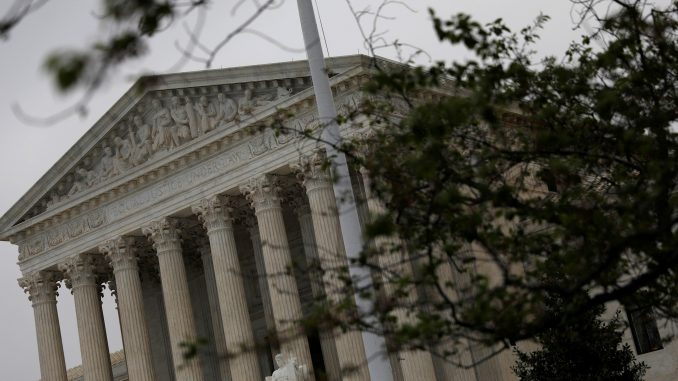
WASHINGTON, D.C. The U.S. Supreme Court has rejected an appeal filed by Republican legislators to overturn a lower court ruling that voiced the state’s voter I.D. law. The court cited what they called a “blizzard” of filings that created confusion over who was authorized to represent the state in the case.The decision leaves in place a July 2016 ruling by the Richmond, Va.-based 4th U.S. Circuit Court of Appeals that ruled the law passed by a Republican-controlled legislature and signed by former N.C. Gov. Pat McCrory was discriminatory.N.C.’s current Gov. Roy Cooper and Democratic Attorney General Josh Stein had told the justices they wanted to drop the state’s appeal of the 4th Circuit ruling. But the Republican-led state legislature said it should be able to intervene in the case to defend the law.Chief Justice John Roberts, citing a “blizzard of filings over who is and who is not authorized to seek review in this court under North Carolina law,” wrote a two-page statement noting that the confusion over who represents the state was a reason not to hear the dispute.”It is unconscionable that Roy Cooper and Josh Stein who ignored state law and flouted their conflicts of interest to kill voter ID in North Carolina have now caused the vast majority of voters who support voter ID to be denied their day in court,” said N.C. Senate Leader Phil Berger (R-Rockingham) and N.C. House Speaker Tim Moore (R-Cleveland). “… All North Carolinians can rest assured that Republican legislators will continue fighting to protect the integrity of our elections by implementing the commonsense requirement to show a photo ID when we vote.”Currently 31 states have a voter ID law, with nine of them more strict than N.C.’s. The North Carolina law, called the Voter Identification and Verification Act, passed in 2014 and required that certain forms of government-issued photo identification cards be presented by voters. It allowed, for example, driver’s licenses, passports and military ID cards but not public assistance cards, giving ammunition to those who called it discriminatory. Other provisions included ending same-day voter registration and reducing the number of early voting days, while keeping the same number of early voting hours. The bill did establish and fund a multiyear plan to provide all N.C. voters free government ID cards ahead of implementation of the law.Civil rights groups, including the state chapter of the NAACP, as well as Democrats claimed the law was racist and contained voter suppression measures intended to make it harder for groups that tend to back Democratic candidates to cast ballots. The NAACP and individual voters sued, arguing it disproportionately burdened black and Hispanic voters.The appeals court ruled the North Carolina law’s provisions “target African-Americans with almost surgical precision” and “impose cures for problems that did not exist,” concluding that the Republican-led legislature enacted the measure “with discriminatory intent.””Today’s announcement is good news for North Carolina voters. We need to make it easier to vote, not harder,” said Cooper in a statement on Twitter Monday. “The court found this law to discriminate against African Americans with ‘surgical precision.’ I will continue to work to protect the rights of every legal registered North Carolinian to participate in our democratic process.”However, the high court was quick to point out that the decision was not a statement on the merits of the case. Citing the confusion over who represents the state as the reason they will not take up the case, Roberts addressed such speculation in his writing. Roberts made an unusual statement saying the high court’s decision not to hear the case should not be taken as an indication of the justices’ views on the broader issues of voter identification.”The effort to confuse who had standing was an effort to stop an almost certain loss by Roy Cooper and Stein,” said N.C. GOP Executive Director Dallas Woodhouse. “Other states have this, other states have stricter laws, so saying we want to pull it back was an effort to gum it up and not to lose. It’ll cost million more dollars and lots more litigation but the end result will be the same. We will have voter ID.”The N.C. Republican Party’s chairman, Robin Hayes, held a press conference after the election saying he anticipates that the work toward establishing a photo ID requirement to vote in N.C. will continue, possibly in the form of new legislation, but the fight is also likely to travel through the court system.”That’s what lawyers do,” said Hayes following the press conference. “There is a clear record by Roy and Josh is using the courts to benefit their position. Do I think they’ll give that up? Absolutely not.”



